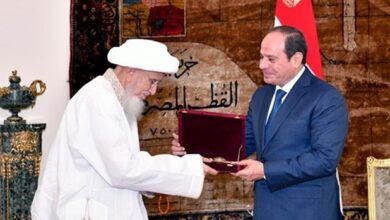WASHINGTON — The new defense minister appointed by Egypt's Islamist president has pledged to uphold the strong military ties between Cairo and Washington, Pentagon chief Leon Panetta said Tuesday.
In a surprise move Sunday, President Mohamed Morsy retired Field Marshal Hussein Tantawi — head of the military council that assumed power after the ouster of Hosni Mubarak — and replaced him with Abdel Fattah al-Sisi.
"General al-Sisi expressed his unwavering commitment to the US-Egypt military-to-military relationship, which has been really an anchor of stability in the Middle East for more than 30 years," Panetta told reporters after a phone conversation with his new counterpart earlier in the day.
"I in turn indicated to him that I look forward to working with him and to continuing the relationship that we have had with Egypt over those years."
The reshuffling was seen as a test of strength between the new civilian government, which is backed by the Muslim Brotherhood, and the military, which held unrivaled influence during Mubarak's three-decade rule.
The move followed a deadly attack on the Egyptian military in the Sinai that prompted an unprecedented military campaign in the lawless peninsula.
Sisi stressed that he takes Egypt's obligations under the Camp David treaty with Israel seriously and that "he's committed to preventing the Sinai from becoming a staging area for militants," Panetta said.
"I indicated that I look forward to working closely with him to advance our shared goals in the region," the defense secretary added.
The United States — which provides over US$1.3 billion in military aid to Egypt every year — on Monday urged the country's military and government to work together.
Islamists won a landslide victory in Egyptian parliamentary elections last year, with the Muslim Brotherhood dominating the lower house.
But the military dissolved parliament in May after the Supreme Constitutional Court annulled the Islamist-led house, a decision rejected by Morsy.
Sunday's announcement marked a new twist in uneasy ties between Morsy and the army, testing the balance of power between the first civilian president in Egypt's history and a military that had moved to limit his power.




